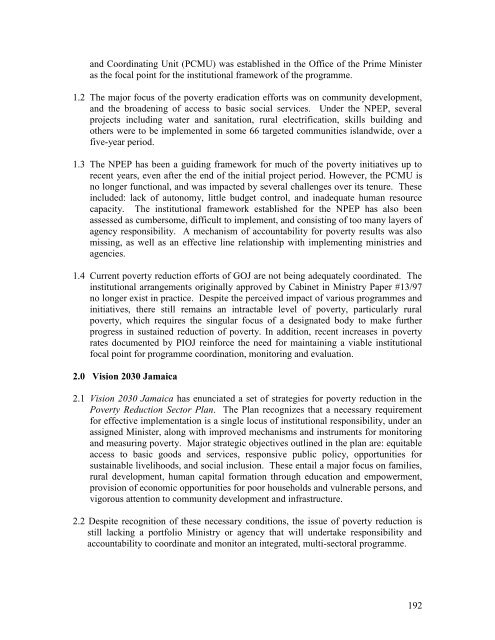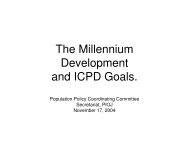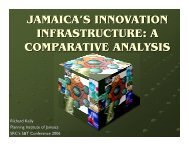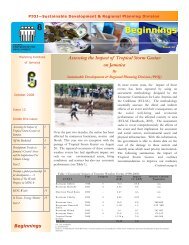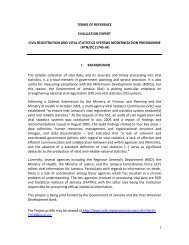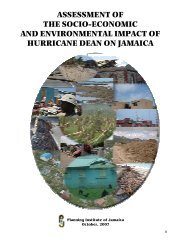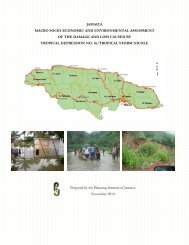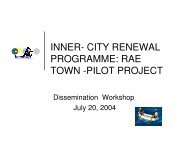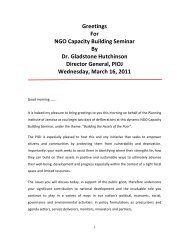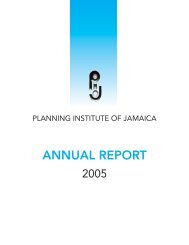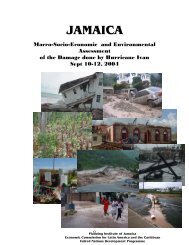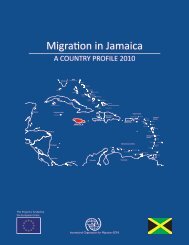PIOJ Growth-Inducement Strategy - Planning Institute of Jamaica
PIOJ Growth-Inducement Strategy - Planning Institute of Jamaica
PIOJ Growth-Inducement Strategy - Planning Institute of Jamaica
You also want an ePaper? Increase the reach of your titles
YUMPU automatically turns print PDFs into web optimized ePapers that Google loves.
and Coordinating Unit (PCMU) was established in the Office <strong>of</strong> the Prime Minister<br />
as the focal point for the institutional framework <strong>of</strong> the programme.<br />
1.2 The major focus <strong>of</strong> the poverty eradication efforts was on community development,<br />
and the broadening <strong>of</strong> access to basic social services. Under the NPEP, several<br />
projects including water and sanitation, rural electrification, skills building and<br />
others were to be implemented in some 66 targeted communities islandwide, over a<br />
five-year period.<br />
1.3 The NPEP has been a guiding framework for much <strong>of</strong> the poverty initiatives up to<br />
recent years, even after the end <strong>of</strong> the initial project period. However, the PCMU is<br />
no longer functional, and was impacted by several challenges over its tenure. These<br />
included: lack <strong>of</strong> autonomy, little budget control, and inadequate human resource<br />
capacity. The institutional framework established for the NPEP has also been<br />
assessed as cumbersome, difficult to implement, and consisting <strong>of</strong> too many layers <strong>of</strong><br />
agency responsibility. A mechanism <strong>of</strong> accountability for poverty results was also<br />
missing, as well as an effective line relationship with implementing ministries and<br />
agencies.<br />
1.4 Current poverty reduction efforts <strong>of</strong> GOJ are not being adequately coordinated. The<br />
institutional arrangements originally approved by Cabinet in Ministry Paper #13/97<br />
no longer exist in practice. Despite the perceived impact <strong>of</strong> various programmes and<br />
initiatives, there still remains an intractable level <strong>of</strong> poverty, particularly rural<br />
poverty, which requires the singular focus <strong>of</strong> a designated body to make further<br />
progress in sustained reduction <strong>of</strong> poverty. In addition, recent increases in poverty<br />
rates documented by <strong>PIOJ</strong> reinforce the need for maintaining a viable institutional<br />
focal point for programme coordination, monitoring and evaluation.<br />
2.0 Vision 2030 <strong>Jamaica</strong><br />
2.1 Vision 2030 <strong>Jamaica</strong> has enunciated a set <strong>of</strong> strategies for poverty reduction in the<br />
Poverty Reduction Sector Plan. The Plan recognizes that a necessary requirement<br />
for effective implementation is a single locus <strong>of</strong> institutional responsibility, under an<br />
assigned Minister, along with improved mechanisms and instruments for monitoring<br />
and measuring poverty. Major strategic objectives outlined in the plan are: equitable<br />
access to basic goods and services, responsive public policy, opportunities for<br />
sustainable livelihoods, and social inclusion. These entail a major focus on families,<br />
rural development, human capital formation through education and empowerment,<br />
provision <strong>of</strong> economic opportunities for poor households and vulnerable persons, and<br />
vigorous attention to community development and infrastructure.<br />
2.2 Despite recognition <strong>of</strong> these necessary conditions, the issue <strong>of</strong> poverty reduction is<br />
still lacking a portfolio Ministry or agency that will undertake responsibility and<br />
accountability to coordinate and monitor an integrated, multi-sectoral programme.<br />
192


